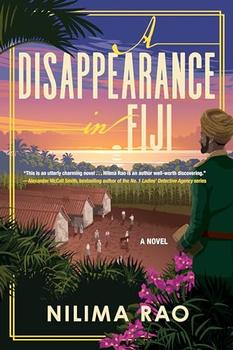Summary | Excerpt | Reading Guide | Reviews | Beyond the Book | Readalikes | Genres & Themes | Author Bio

Father Hughes went into another room while Akal waited, his right knee starting to restlessly bounce up and down. Meanwhile, Hetty, the woman who had been sweeping in the church, arrived with the tea.
"Chewing your ear off, I suppose?" she said with a wry smile, as she put the tray down and poured both cups full of strong milky tea.
Akal looked at her blankly.
"Going on about the coolies," she clarified. "He has responsibilities here in Suva, you know, but no, he is always gallivanting around the country." She tutted as she handed Akal his cup and passed the sugar bowl.
Father Hughes returned holding an album before she could elaborate. Hetty gave the priest his cup of tea and bustled out, admonishing him not to take too long and to remember his unfinished sermon. Father Hughes waved her away. He balanced the album on his knees and flipped the thick brown cardboard pages, stopping about halfway through. He turned the book around to show Akal a blackand- white photograph of an Indian woman.
"This is Kunti. She is a real person, Sergeant Singh."
"Yes, sir." Akal kept his tone respectful, though he thought perhaps his one eyebrow creeping towards his turban may have negated the effect. He reached out and took the album for a closer look. The photograph was of Kunti's head and shoulders, sari draped over her hair. Elongated eyes tipped up at the ends, dominating her face, drawing him in. She was not actually smiling, but there was something about her eyes which spoke of joy. It certainly did not look as though Kunti was imminently running away, though what that might look like Akal didn't know. "How did you get this photograph?"
"I took it the first time I met Kunti, at the plantation. I was travelling around the colony, gathering information for my report for the Church. I'm trying to show how the terrible conditions the Indians are living in are resulting in their moral decline. The Church is deciding on its position on the indentured servitude program, and when the bishops see my report, I think the conclusion will be unavoidable. The situation on the plantations is an indictment of the indenture system, and it is incumbent on all good Christians to—"
"You said you met Kunti on the plantation?" Akal interrupted, putting his hand up to stem the torrent of words.
The priest started and then nodded, climbing down from atop his soapbox and back to the present.
"Hmm, yes. It was towards the end of my trip; the Parkins plantation was one of my last stops. I was tired, a little numb. The visit started with the usual hostile conversation with Henry Parkins. 'What's the problem?' he said. 'They all signed their contracts.' Hmph. Put their thumbprints on a contract they could not even read, more like. They were told all sorts of stories. Do you know, one of the common lies was that Fiji was just south of Calcutta! Told that the work was easy when really the daily 'task' defined in the contract was only achievable by the strongest. Never told that if they didn't complete the full task in a day, that day didn't count towards the contract. Never knowing that they had sold themselves into slavery for five years."
Akal had heard some of these claims before, but he had never known how much to believe. Father Hughes's passionate recital gave him the uneasy sense that perhaps he should have paid more attention in the past. He rubbed his forehead and said, resigned, "Yes, sir. Please continue."
The priest took a deep breath, chest swelling in his fervour. "None of the plantation owners want reform of the system. They are all much more concerned about the state of their pockets than the state of their souls, you see. None of them are happy to see me. But Parkins knew better than to bar me from the plantation altogether. He would have, if he thought he could get away with it. But the man has some political ambitions, and he wants to stay on the right side of the Church." He waved his finger at Akal and nodded with grim satisfaction. "After reminding Parkins of his Christian duty, I went to visit some of the women where they were working. They were removing weeds from a field of young sugar cane. They were spread out across the field and they couldn't stop working, of course, so I was walking from one to the next, seeing if anybody would talk to me."
Excerpted from A Disappearance in Fiji by Nilima Rao. Copyright © 2023 by Nilima Rao. Excerpted by permission of Soho Crime. All rights reserved. No part of this excerpt may be reproduced or reprinted without permission in writing from the publisher.




We should have a great fewer disputes in the world if words were taken for what they are
Click Here to find out who said this, as well as discovering other famous literary quotes!
Your guide toexceptional books
BookBrowse seeks out and recommends the best in contemporary fiction and nonfiction—books that not only engage and entertain but also deepen our understanding of ourselves and the world around us.